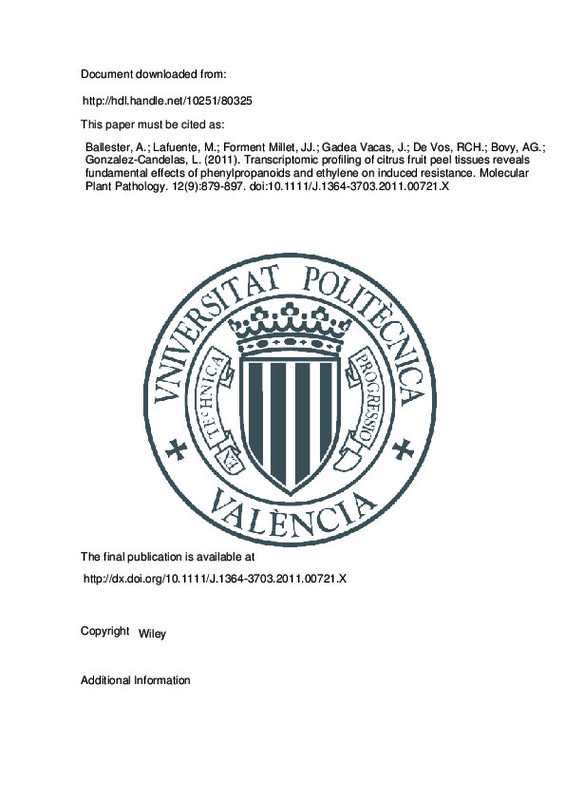JavaScript is disabled for your browser. Some features of this site may not work without it.
Buscar en RiuNet
Listar
Mi cuenta
Estadísticas
Ayuda RiuNet
Admin. UPV
Transcriptomic profiling of citrus fruit peel tissues reveals fundamental effects of phenylpropanoids and ethylene on induced resistance
Mostrar el registro sencillo del ítem
Ficheros en el ítem
| dc.contributor.author | Ballester, Ana-Rosa
|
es_ES |
| dc.contributor.author | Lafuente, M.T.
|
es_ES |
| dc.contributor.author | Forment Millet, José Javier
|
es_ES |
| dc.contributor.author | Gadea Vacas, José
|
es_ES |
| dc.contributor.author | De Vos, Ric C. H.
|
es_ES |
| dc.contributor.author | Bovy, Arnaud G.
|
es_ES |
| dc.contributor.author | Gonzalez-Candelas, Luis
|
es_ES |
| dc.date.accessioned | 2017-05-02T12:08:34Z | |
| dc.date.available | 2017-05-02T12:08:34Z | |
| dc.date.issued | 2011-12 | |
| dc.identifier.issn | 1464-6722 | |
| dc.identifier.uri | http://hdl.handle.net/10251/80325 | |
| dc.description.abstract | [EN] Penicillium spp. are the major postharvest pathogens of citrus fruit in Mediterranean climatic regions. The induction of natural resistance constitutes one of the most promising alternatives to avoid the environmental contamination and health problems caused by chemical fungicides. To understand the bases of the induction of resistance in citrus fruit against Penicillium digitatum, we have used a 12k citrus cDNA microarray to study transcriptional changes in the outer and inner parts of the peel (flavedo and albedo, respectively) of elicited fruits. The elicitor treatment led to an over-representation of biological processes associated with secondary metabolism, mainly phenylpropanoids and cellular amino acid biosynthesis and methionine metabolism, and the down-regulation of genes related to biotic and abiotic stresses. Among phenylpropanoids, we detected the over-expression of a large subset of genes important for the synthesis of flavonoids, coumarins and lignin, especially in the internal tissue. Furthermore, these genes and those of ethylene biosynthesis showed the highest induction. The involvement of both phenylpropanoid and ethylene pathways was confirmed by examining changes in gene expression and ethylene production in elicited citrus fruit. Therefore, global results indicate that secondary metabolism, mainly phenylpropanoids, and ethylene play important roles in the induction of resistance in citrus fruit. | es_ES |
| dc.description.sponsorship | The technical assistance of Ana Izquierdo (IATA-CSIC, Valencia-Spain) is gratefully acknowledged. This work was supported by Research Grants AGL2002-1227 and AGL2005-04921-C02-01 from the Spanish Ministry of Science and Technology and PROMETEO/2010/010 from the Generalitat Valenciana. A-RB, RCHdV and AGB acknowledge the Centre for Biosystems Genomics, which is part of the Netherlands Genomics Initiative, for additional funding. | |
| dc.language | Inglés | es_ES |
| dc.publisher | Wiley | es_ES |
| dc.relation.ispartof | Molecular Plant Pathology | es_ES |
| dc.rights | Reserva de todos los derechos | es_ES |
| dc.subject.classification | BIOQUIMICA Y BIOLOGIA MOLECULAR | es_ES |
| dc.title | Transcriptomic profiling of citrus fruit peel tissues reveals fundamental effects of phenylpropanoids and ethylene on induced resistance | es_ES |
| dc.type | Artículo | es_ES |
| dc.identifier.doi | 10.1111/J.1364-3703.2011.00721.X | |
| dc.relation.projectID | info:eu-repo/grantAgreement/MICYT//AGL2002-1227/ | es_ES |
| dc.relation.projectID | info:eu-repo/grantAgreement/MEC//AGL2005-04921-C02-01/ES/ESTUDIO MOLECULAR DE LOS FACTORES DE PATOGENICIDAD%2FVIRULENCIA DE PENICILLIUM DIGITATUM/ | es_ES |
| dc.relation.projectID | info:eu-repo/grantAgreement/GVA//PROMETEO%2F2010%2F010/ES/Nuevas aproximaciones fisiológicas y biotecnológicas en postcosecha de frutos/ | es_ES |
| dc.rights.accessRights | Abierto | es_ES |
| dc.contributor.affiliation | Universitat Politècnica de València. Departamento de Biotecnología - Departament de Biotecnologia | es_ES |
| dc.contributor.affiliation | Universitat Politècnica de València. Instituto Universitario Mixto de Biología Molecular y Celular de Plantas - Institut Universitari Mixt de Biologia Molecular i Cel·lular de Plantes | es_ES |
| dc.description.bibliographicCitation | Ballester, A.; Lafuente, M.; Forment Millet, JJ.; Gadea Vacas, J.; De Vos, RCH.; Bovy, AG.; Gonzalez-Candelas, L. (2011). Transcriptomic profiling of citrus fruit peel tissues reveals fundamental effects of phenylpropanoids and ethylene on induced resistance. Molecular Plant Pathology. 12(9):879-897. https://doi.org/10.1111/J.1364-3703.2011.00721.X | es_ES |
| dc.description.accrualMethod | S | es_ES |
| dc.relation.publisherversion | http://dx.doi.org/10.1111/J.1364-3703.2011.00721.X | es_ES |
| dc.description.upvformatpinicio | 879 | es_ES |
| dc.description.upvformatpfin | 897 | es_ES |
| dc.type.version | info:eu-repo/semantics/publishedVersion | es_ES |
| dc.description.volume | 12 | es_ES |
| dc.description.issue | 9 | es_ES |
| dc.relation.senia | 213874 | es_ES |
| dc.identifier.pmid | 21726388 | |
| dc.contributor.funder | Ministerio de Ciencia y Tecnología | |
| dc.contributor.funder | Generalitat Valenciana | |
| dc.contributor.funder | Ministerio de Educación y Ciencia | es_ES |







![[Cerrado]](/themes/UPV/images/candado.png)

